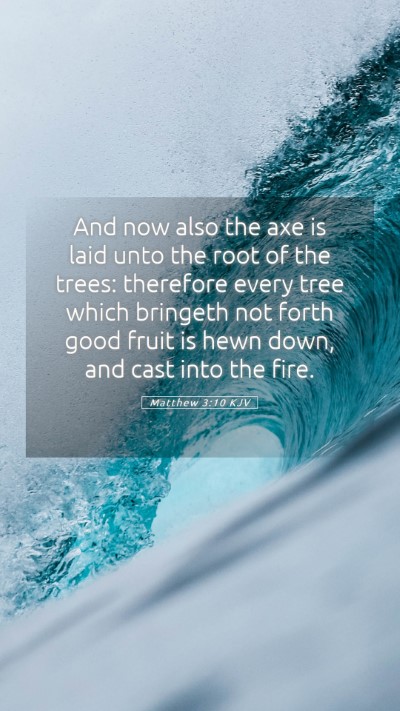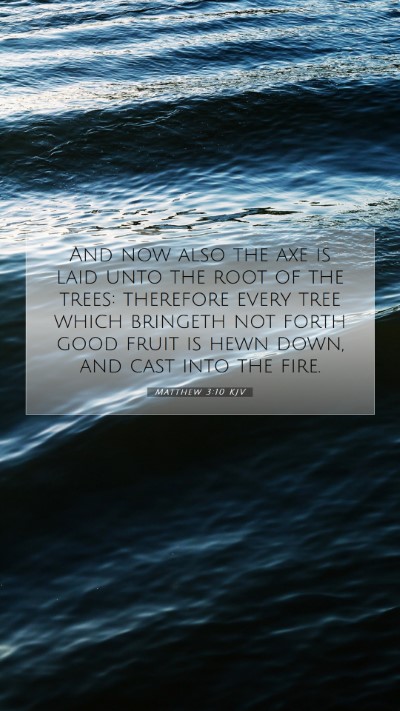Bible Verse Meaning and Interpretation of Matthew 3:10
Verse: "And now also the axe is laid unto the root of the trees: therefore every tree which bringeth not forth good fruit is hewn down, and cast into the fire." - Matthew 3:10
This verse, nestled in the context of John the Baptist's preaching, serves as a stern warning regarding divine judgment and the necessity of producing good fruit in one’s life. Here is a comprehensive exploration of its meaning based on insights from public domain commentaries.
Summary of Commentary Insights
-
Matthew Henry's Commentary:
Matthew Henry emphasizes the urgency of repentance as John the Baptist proclaims the impending judgment. The "axe" symbolizes God’s readiness to remove those who do not bear righteous fruit. This metaphor reveals the seriousness with which God views unfruitfulness in spiritual matters.
-
Albert Barnes' Notes:
Barnes highlights that the "root of the trees" indicates the foundational aspects of one’s life and spirituality. When referenced as being cut down, it signifies the judgment upon those whose lives do not reflect God’s work. He also notes that the fire represents hell, illustrating the ultimate consequences facing the unrepentant sinner.
-
Adam Clarke's Commentary:
Clarke points out the importance of bearing "good fruit," which refers to tangible acts of righteousness and faithfulness. He states that the fruit is indicative of the nature of the tree; thus, a true believer must naturally produce works that demonstrate their faith and commitment to God.
Meaning of Bible Verses
This verse underscores the necessity of genuine spiritual transformation—indicating that mere lineage (being a child of Abraham, as mentioned earlier in Matthew 3:9) does not guarantee favor with God. It is a clarion call for introspection on one's spiritual life.
Understanding Scripture in Context
To fully grasp the weight of Matthew 3:10, one must consider the scriptural context surrounding John the Baptist's ministry. His intense message serves as a precursor to the coming of Jesus, reinforcing the idea that the Kingdom of Heaven is near and demands a response of repentance from all.
Application of the Verse
The call to bear good fruit is crucial in applying this scripture to daily life. Believers are encouraged to reflect on their own lives—what actions and attitudes do they exhibit that align with the teachings of Christ? This verse promotes an active faith that seeks to serve and bear witness to God’s love.
Cross References
- Luke 3:9: "And now also the axe is laid unto the root of the trees: every tree therefore which bringeth not forth good fruit is hewn down, and cast into the fire."
- John 15:2: "Every branch in me that beareth not fruit he taketh away: and every branch that beareth fruit, he purgeth it, that it may bring forth more fruit."
- Galatians 5:22-23: "But the fruit of the Spirit is love, joy, peace, longsuffering, gentleness, goodness, faith, meekness, temperance: against such there is no law."
Exploring Biblical Exegesis
In-depth biblical exegesis reveals how Matthew 3:10 not only warns of impending judgment but also invites believers to explore the characteristics of a life well-lived in accordance with God’s commands. The interplay between judgment and grace becomes a focal point for deeper study.
Bible Study Insights
Utilizing this verse in bible study groups can foster discussions around personal accountability and the evidence of faith in action. It encourages the use of bible study tools and bible study guides to delve into understanding Scripture and applying its truths practically.
Conclusion
Matthew 3:10 serves as a powerful reminder of the necessity of living a fruitful Christian life, rooted in repentance and active faith. Each believer is challenged to assess their spiritual vitality and the extent to which their lives reflect the love and teachings of Jesus Christ. Engaging with this verse thoroughly will enrich one’s bible study and enhance the understanding of Scripture as a whole.


